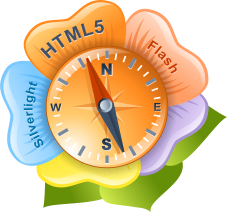
| Online data visualization is very popular nowadays since it offers such advantages as getting data in real time and access from any location and device. More and more companies move their information monitoring and dashboard apps to web. And here they face some problems including what technology and software to use to migrate to web. Flash? The oldest technology that is a recognized standard for online data visualization. Some time ago Flash was the only alternative for Rich internet applications no matter data visualization or not. This is also a great platform with great tools and features, but it has some vital limitations. The first one is that most likely you will need to hire a dedicated team of experienced Flash developers as the technology is very specific. |
The second one is that even the most stunning Flash data visualization app with high interactivity won’t work on iPad and iPhone and other mobile platforms that became more and more popular among users including corporate employees.
Silverlight?
This a very powerful technology featuring great tools for multimedia and data visualization that became very popular among .NET developers. Its cross platform compatibility providing equal performance from all available devices and browsers made it a real promising candidate for data visualization base technology. But after Microsoft Corp. announced that they are not going to develop and promote Silverlight with the same effort interest to this amazing platform became not so intensive. Less and less developers get approval to use Silverlight in corporate applications taking into consideration development and maintenance issues that may arise.
Moreover, yesterday May 29, 2012 Xamarin (the company behind the Mono open-source implementation of Microsoft’s C# and the Common Language Runtime) announced abandonment of Moonlight the open-source implementation of Silverlight for Linux and Unix.
HTML5?
Slowly developed, but still the most promising web technology for real-time data visualization. While it features improved support for the latest multimedia abilities, it is easily readable by humans and clearly understood by all computer types (desktop, laptops, tablets, mobile devices) and software utilities (IE, Firefox, Safari, Chrome, various parsers, etc.). So, the problem with accessibility from various locations and devices is eliminated. Taking into account that data visualization elements are inserted in the web page as simple JavaScript code, i.e. convenience and speed of development, HTML5 is a good fit for this purpose.
Available HTML5 gauge components?
Perfect Widgets offers a library of 50+ pre-designed gauges that can be easily adjusted. It is possible to edit, remove and add separate gauge elements or modify the whole gauge by applying the pre-designed or newly created styles. Just get JavaScript code of the designed data visualization element and insert it anywhere on the web page. The controls are interactive; users can change value, definite events can be handled in JavaScript. No need to say about cross platform compatibility – gauges work and can be accessed from anywhere.
So, online data visualization based on HTML5 comes to new level with extended multimedia features and ability to be understood by all devices and software.